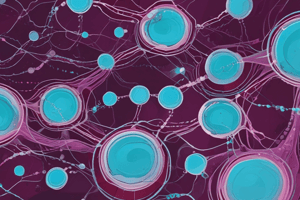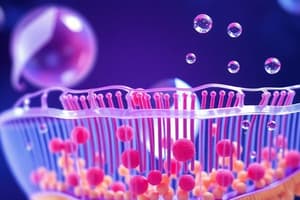Podcast
Questions and Answers
What is the primary role of the cell membrane in relation to homeostasis?
What is the primary role of the cell membrane in relation to homeostasis?
- To provide structural support to the cell
- To facilitate energy production
- To assist in viral replication
- To regulate transport in and out of the cell (correct)
What mechanism is NOT typically involved in transport across the cell membrane?
What mechanism is NOT typically involved in transport across the cell membrane?
- Facilitated diffusion
- Protein synthesis (correct)
- Simple diffusion
- Active transport
How does the phospholipid bilayer of the cell membrane contribute to selective permeability?
How does the phospholipid bilayer of the cell membrane contribute to selective permeability?
- It allows all substances to pass freely due to its fluid nature.
- Only hydrophilic substances can interact with the tails for passage.
- The hydrophobic tails prevent water from entering the cell.
- The arrangement of phospholipids blocks large molecules, enabling selective transport. (correct)
Why do viruses need to hijack a host cell for replication?
Why do viruses need to hijack a host cell for replication?
Which statement best describes the fluid mosaic model of the cell membrane?
Which statement best describes the fluid mosaic model of the cell membrane?
What happens to cells when a person drinks a lot of salt water?
What happens to cells when a person drinks a lot of salt water?
What term is used for a cell that has the potential to differentiate into any cell type?
What term is used for a cell that has the potential to differentiate into any cell type?
Which of the following best describes the function of cyclins in the cell cycle?
Which of the following best describes the function of cyclins in the cell cycle?
What is a common physiological result of dehydration caused by salt water intake?
What is a common physiological result of dehydration caused by salt water intake?
How do stem cells differentiate into specialized cells?
How do stem cells differentiate into specialized cells?
What occurs in cancer regarding the cell cycle?
What occurs in cancer regarding the cell cycle?
What is the primary role of growth factors in the cell cycle?
What is the primary role of growth factors in the cell cycle?
In a multicellular organism, what is a consequence of uncontrolled cell division?
In a multicellular organism, what is a consequence of uncontrolled cell division?
What is the primary function of transport proteins in the cell membrane?
What is the primary function of transport proteins in the cell membrane?
In which type of transport does a substance move against its concentration gradient?
In which type of transport does a substance move against its concentration gradient?
What effect does a hypertonic solution have on plant cells?
What effect does a hypertonic solution have on plant cells?
How does facilitated diffusion differ from simple diffusion?
How does facilitated diffusion differ from simple diffusion?
Which solution condition is ideal for animal cells to maintain homeostasis?
Which solution condition is ideal for animal cells to maintain homeostasis?
Which mechanism requires ATP to function?
Which mechanism requires ATP to function?
What occurs to a plant cell in a hypotonic solution?
What occurs to a plant cell in a hypotonic solution?
What defines the fluid mosaic model of the cell membrane?
What defines the fluid mosaic model of the cell membrane?
Flashcards are hidden until you start studying
Study Notes
Cell Biology and Transport Mechanisms
- Water moves from regions of higher water concentration to lower when the solute concentration is higher outside cells, causing dehydration in cells exposed to saltwater.
- Cells in multicellular organisms undergo a regulated cell cycle for growth, repair, and development, starting from a single fertilized cell.
- Stem cells are undifferentiated, influenced by neighboring cells to specialize; differentiated cells perform specific functions.
- Prokaryotes lack specialization and fulfill all cellular roles within a single cell.
- Types of stem cells include:
- Totipotent: can transform into any cell type.
- Pluripotent: can become most cell types.
- Multipotent: limited to a few specific cell types.
Cell Cycle Regulation
- The cell cycle is controlled by growth factors (external signals) and cyclins (internal proteins necessary for progression).
- Cancer disrupts normal cell cycle regulation, often leading to unregulated cell division with no G1 phase.
- Selectively permeable cell membranes allow only certain substances through, with the help of transport proteins.
Transport Mechanisms
- Simple diffusion allows particles to move across membranes from high to low concentration without energy.
- Facilitated diffusion utilizes transport proteins for particle movement across membranes, also without energy.
- Active transport requires ATP to move substances against their concentration gradient via channels or pumps.
Osmosis and Cellular Response to Solutions
- Cells respond differently to hypertonic, hypotonic, and isotonic conditions.
- Isotonic: favorable for animal cells, maintaining normal water balance.
- Hypotonic: preferred by plant cells, enhancing turgidity and structural support.
- Water moves by osmosis from high water concentration to low, impacting cell shape and rigidity.
Cell Membrane Structure and Function
- The fluid mosaic model describes the dynamic nature of the phospholipid bilayer, which comprises diverse and movable components.
- Phospholipid bilayer's hydrophobic tails create selective permeability, limiting how substances pass through, necessitating specific channel proteins for some materials to enter cells.
Studying That Suits You
Use AI to generate personalized quizzes and flashcards to suit your learning preferences.




